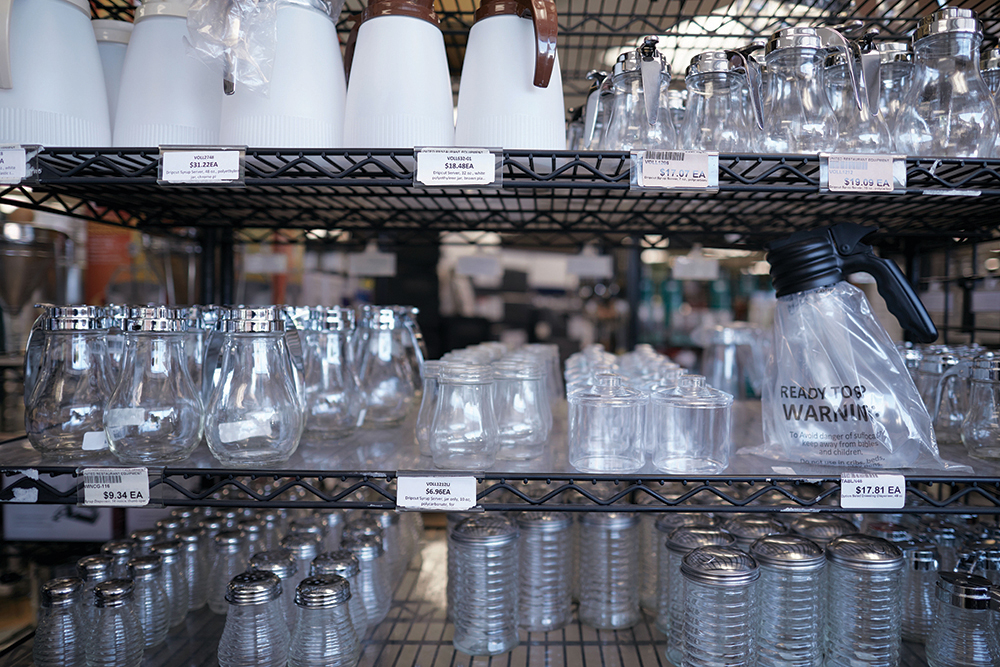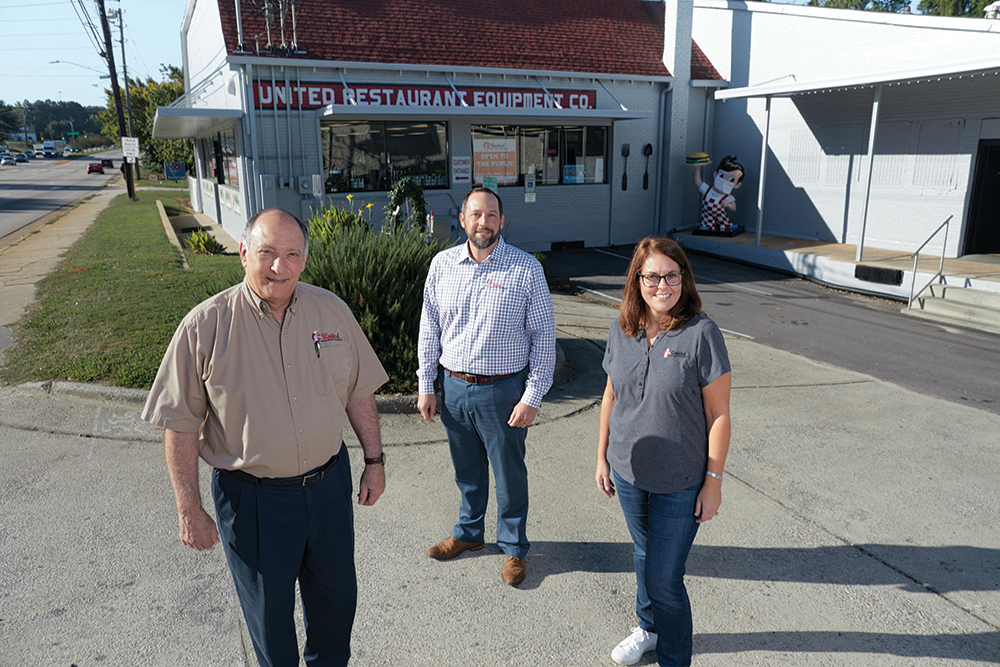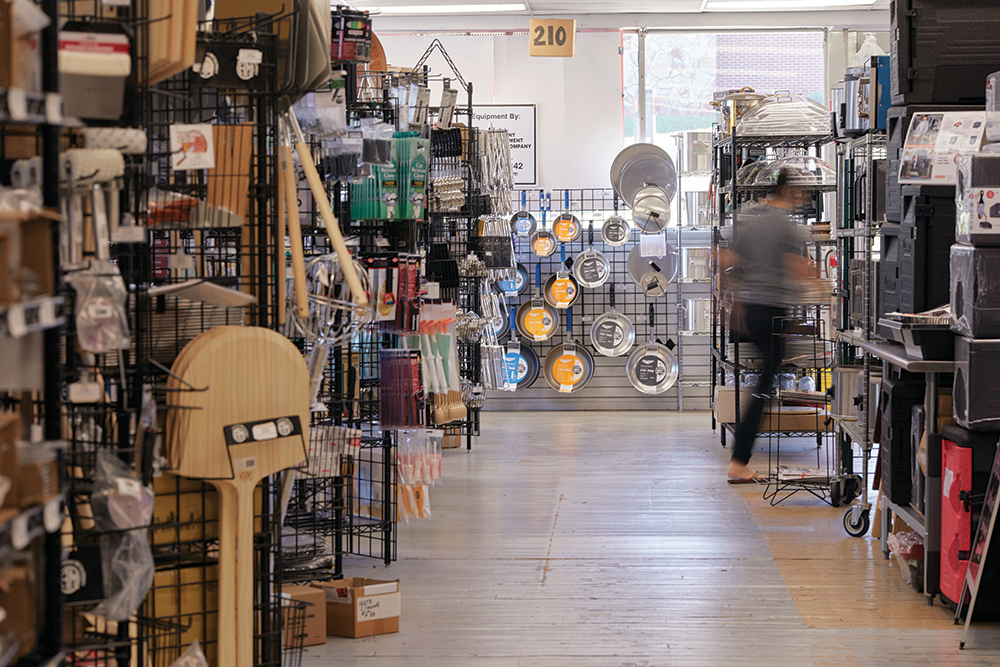A down-to-earth restaurant supply and kitchenware store serves professionals and home cooks alike.
by Noor Azeem | photography by Joshua Steadman
From kitschy food trucks to rooftop bars to cozy restaurants, chances are United Restaurant Equipment Company had a hand in bringing those visions to life. United Restaurant Equipment Company (URECO) is a family-run business, three generations in, that’s entrenched in the local Raleigh community in a way few other businesses are. And when you step through the front doors of the no-frills, 15,000 square foot showroom on South Saunders— marked by a jaunty retro statue of a waiter at the front door— you can’t help but feel that connection, too.
In 1952, Jesse Margulies, home from serving in World War II, bought Steinberg’s furniture store on Wilmington Street and transformed it into URECO. By 1957, they had already outgrown the space and moved to the current location. Originally a horse barn, Margulies bought it and promptly ripped out the stalls, making way for the inventory to come, and the family has expanded it twice since. “You immediately know you’re in an old building. You get this feeling of nostalgia when you walk in, even if you’ve never been here,” says Alisha Dreese, Margulies’s granddaughter. Dreese wears a lot of hats: she’s been active in the business for 10 years and her role has morphed from counter sales to HR to general management, while also handling social media updates, day-to-day operations and details like beautification (most recently, she commissioned local artist Denise Hughes to paint a mural on the building’s exterior). Her uncle, Howard Margulies, has also been involved in the family business since 1970, and his son Eric Margulies currently serves as President.
The core clientele of United Restaurant Equipment Company is restaurants, but they handle everything from mom-and-pop restaurants, chains, the local prison system and the school system. According to Dreese, there are two sides to the company. The first is their commercial side, to design/build and supply restaurants. “It’s where somebody comes in and says, I have a dream. I’ve always wanted to own a sandwich shop. Can you help me make it happen?” says Dreese. One of the people whose dreams they helped realize was Maggie Kane, founder of A Place at the Table, who says the team would “drop everything” when they needed help. “We love them so much. They have been so incredibly generous and kind to use,” says Kane. “Alisha is one of my favorite people, she sat on our board for years and even volunteered in the cafe many weekends.”
The second is the retail side. The showroom, which is open to the public and home to a vast array of kitchen gadgets and gear, has historically been packed, but lately, it’s fallen prey to the pandemic—with bars closed, no one is buying glassware. “Our showroom has taken a significant hit,” says Dreese. On good days, the showroom attracts an amalgam of families looking for particular products, restaurant owners restocking or shopping around and students about to enter culinary school, loading up on baking and cooking supplies.
The latter group is one of Dreese’s favorites. “You watch people grow and feel like you played a part. It’s something so special. We have this emotional attachment—every time we see someone get an award or go out and do something really good to make a difference in the community, it gives us pride, the same feeling I get with my kids. These people, our customers, are the ones who created the culture in this city.”
To Dreese, the showroom is a space unlike any other: “We’re unique. We have some really cool things that you can use in your kitchen and home. And you can be walking in and Jason Smith or Scott Crawford will be standing there. Everybody’s talking and laughing.” It’s not just a place to shop, she says, it’s a spot for Raleigh’s culinary minds to come together. “So many times, I’ve watched people having deep conversations, working on issues that have come across in our industry,” says Dreese. “They’re mapping things out together and coming together.”
Its community impact goes beyond their inventory list and showroom. Dreese serves on the Wake County Food Service Advisory Board, and speaks at a food truck class at Wake Tech Community College. The class was started by Rebecca Robbins, who approves food trucks for Wake County. After witnessing people buy trucks without knowing how to make sure the equipment inside was up to code, or buying excess equipment, they came together to provide an education program that’d help people get into the business without losing money.
Normally, the showroom is packed prior to Thanksgiving— every November, without fail, they have to double their usual supply of hurricane burners, giant stock pots, thermometers and basters because “we have become known as the place to come to get the stuff to fry a turkey.” And while Thanksgiving will be smaller than usual this year, they’ll still have anything a home cook needs, from ladles to pitchers to cutting boards and more, she says, at a budget-friendly price point.
“I would call us a gritty Williams-Sonoma,” Dreese says. “No pomp and circumstance, just what you need.”



